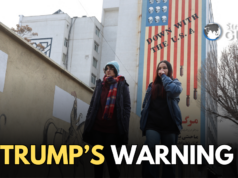If one were to go by conventional wisdom being promoted by the Indian establishment, a Trump White House is definitely a win for India in many ways.
A harder line on China, tough love for Pakistan, Afghanistan over terrorism and proliferation, and support for Hindus being persecuted by the un-elected regime in Bangladesh align perfectly with India’s worldview. And this apparently is likely to yield major strategic and economic benefits, despite possible friction over tariffs, climate change and immigration policies.
Add the personal strong personal relationship between Trump and Prime Minister Narendra Modi, and we have a clear win-win situation, we are told.
Professor Amit Gupta, Senior Advisor to The Forum of Federations, and perhaps one of the most incisive foreign policy analysts on the planet, however, has a different take.
To start with, at a time when India and China have finally agreed to disengage along the Line of Actual Control, what does a ‘harder line’ against the People’s Republic really mean, he wonders on this episode of The Gist, StratNewsGlobal’s flagship chat show on YouTube.
Besides, “Just because Trump wants to be more aggressive towards China, it doesn’t automatically mean that he’s going to be nicer to India,” he argues. In fact, he’s already talked about India amongst countries imposing higher tariffs, cheating various trade issues, and so on, “so I’m not sure if that friendship is really there,” he says.
For Indians who say they know how to deal with Trump, having dealt with him during his earlier term, he asks: “Sure you know how to deal with him. But what did you do during his earlier term that was so exceptional?”
According to Prof Gupta, whose work takes him around the world advising governments and thinktanks of various shades and hues on how to not just deal with critical foreign policy issues, but also to perceive these issues from a different perspective, India does not figure on Trump’s tier I priorities in terms of foreign policy, and perhaps not even on tier II.
“Look at what Indo-US relations got caught up on during Trump’s first term, like Harley Davidsons and the import duty on them,” he says. “How many Harley Davidsons do you see on Indian streets? So why was this even an issue?” he wonders.
“It is these kind of small, petty things that become subjects of debate between India and the United States,” he notes. “In big areas, like technology transfers, access of Indians to the U.S. labour market, that’s where I think the conflicts and clash of interests will come between India and the United States.”
Besides, “if you want to be Trump’s ally, you have to start doing things which you won’t like doing. Like taking an overt military posture against China. And after just disengaging along the border, do you think Delhi can suddenly say we are now going to ‘re-engage’ again?” he asks.
As for hopes that higher tariffs on China made products would revive the China + 1 policies and drive more investments towards India, he says the Americans had already tried that, and the Chinese outsmarted them. “They moved their factories to Vietnam, where 49 per cent content was from China and the other 51 per cent in Vietnam, and 100 per cent of the profits went to China.”
Similarly, Indian is in BRICS, (Brazil, Russia, India, China and South Africa) and the BRICs means Russia and China. So if you listen to Trump and get out of BRICs, you allow the Russia China alliance to come about, which is not in India’s long term interests, he notes. “Iran is in BRICs. We all know Trump really doesn’t like Iran. What are you going to do?”
Similarly, if Trump says we need to protect Taiwan, will India send INS Vikramaditya to the South China Sea, he asks.
“I can bet you ₹1,000 when push comes to shove, they won’t do that,” says Prof Gupta. “They will sit and engage in studious inaction and make the kind of statements the Australians and the Japanese did after the Galwan incident,” which led to the stand off on the Sino-Indian border.
“They didn’t say the Chinese were to blame. They said we view this issue with grave concern. What the hell does that mean? And the Japanese, the other people who we love so dearly in New Delhi, said exactly the same thing. Nobody said China took Indian territory.”
“Indians also need to remember that when Mumbai terror attacks happened, India was told to exercise restraint. Did Biden tell Netanyahu to exercise restraint? Is Trump going to tell Netanyahu to exercise restraint? The day you reach that situation where they start telling you, yeah, go and kill as many Pakistanis as you like, then they’re your friends.”
To get more fascinating insights into not just the India-U.S. relations under a Trump administration, but into the U.S. policymaking process and its foreign and domestic priorities, watch the full interview.
In a career spanning three decades and counting, Ramananda (Ram to his friends) has been the foreign editor of The Telegraph, Outlook Magazine and the New Indian Express. He helped set up rediff.com’s editorial operations in San Jose and New York, helmed sify.com, and was the founder editor of India.com.
His work has featured in national and international publications like the Al Jazeera Centre for Studies, Global Times and Ashahi Shimbun. But his one constant over all these years, he says, has been the attempt to understand rising India’s place in the world.
He can rustle up a mean salad, his oil-less pepper chicken is to die for, and all it takes is some beer and rhythm and blues to rock his soul.
Talk to him about foreign and strategic affairs, media, South Asia, China, and of course India.




